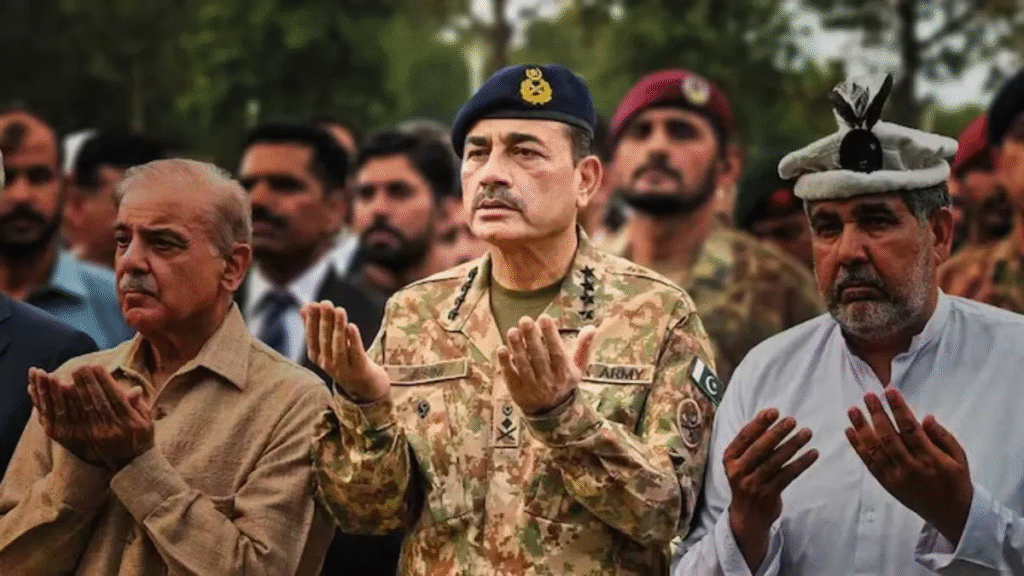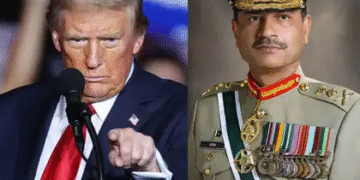Israeli officials have repeatedly indicated that they are seeking to destabilise the Iranian government or see it toppled through their strikes
Pakistan army chief Asim Munir, during a meeting with US President Donald Trump this week, discussed the developing Israel-Iran conflict and advised against “any collapse of authority in Iran.”
According to Reuters, Munir raised concerns that separatist and jihadist militants on the Pakistan-Iran border could take advantage of any collapse of authority in Iran, as anti-Iranian and anti-Pakistan outfits operate on both sides.
His remarks come as Israeli officials have repeatedly indicated that they are seeking to destabilise the Iranian government or see it toppled through their strikes.
Following a Wednesday lunch at the White House with Pakistan’s army chief, Trump referred to Pakistan’s views on the Israel-Iran conflict and said, “They’re not happy about anything.”
Some of the militant groups on the border have welcomed the upheaval.
Jaish al-Adl (JaA), an Iranian jihadist group formed from ethnic Baluch and Sunni Muslim minorities and which operates from Pakistan, said Israel’s conflict with Iran was a great opportunity.
“Jaish al-Adl extends the hand of brotherhood and friendship to all the people of Iran and calls on all people, especially the people of Baluchistan, as well as the armed forces, to join the ranks of the Resistance,” the group said in a statement on June 13.

Conversely, Pakistan fears that separatist militants from its own Baluch minority, who are based in Iran, will also seek to step up attacks.
Pakistan’s military said on Thursday that Munir and Trump had discussed Iran,“with both leaders emphasising the importance of resolving the conflict.”
Pakistan has condemned Israel’s attack on Iran as a violation of international law.
“This is for us a very serious issue, what is happening in our brotherly country of Iran,” Shafqat Ali Khan, spokesman for Pakistan’s Ministry of Foreign Affairs, said on Thursday. “It imperils the entire regional security structure, it impacts us deeply.”
Pakistan army chief Asim Munir met this week with US President Donald Trump in the White House at the latter’s invitation, a meeting that has raised eyebrows in Delhi following the tension that arose between India and Pakistan after the Pahalgam terror attack.
In a dramatic diplomatic exchange that could have far-reaching geopolitical implications, Pakistan’s Chief of Army Staff General Asim Munir reportedly warned former U.S. President Donald Trump about the severe consequences of a power vacuum in Iran. The closed-door meeting, held amid escalating tensions in the Middle East, underscored Munir’s growing international stature and Pakistan’s emerging role as a regional stabilizer.

The warning was clear and unequivocal: if Iran’s internal structure collapses, the shockwaves could destabilize the entire Middle East, plunge the region into sectarian conflict, empower extremist factions, and threaten nuclear non-proliferation agreements. This rare intervention by a top Pakistani military leader into the politics of the Gulf region raises eyebrows globally—and here’s why the warning matters now more than ever.
General Munir’s warning is rooted in Iran’s current state of political and economic turmoil. Decades of U.S.-led sanctions have crippled its economy, inflation has soared above 50%, and youth unemployment is rising. Meanwhile, widespread protests—triggered by the death of Mahsa Amini in 2022—have evolved into calls for regime change, shaking the very foundation of the Islamic Republic.
Adding to this instability, Iran’s Supreme Leader Ayatollah Ali Khamenei is aging, and the question of succession remains a political landmine. The country has no clear consensus on who will lead next, and any sudden leadership vacuum could push rival factions into a deadly power struggle.
General Munir reportedly told Trump that a regime collapse without a roadmap for succession would unleash chaos, not only within Iran but across the broader Shiite-Sunni divide in the Middle East.
One of General Munir’s key concerns revolves around Iran’s extensive proxy network—which includes Hezbollah in Lebanon, the Houthis in Yemen, Shia militias in Iraq, and militant groups in Syria. Iran is often described as the “central nervous system” of these proxy forces.
A collapsed Iran means unleashed militias with no central command, leading to the proliferation of armed non-state actors across the region. This could result in a military free-for-all, where proxy groups act independently, escalate violence, and potentially attack U.S., Israeli, or Gulf targets, drawing major powers into direct conflict.
General Munir emphasized that Pakistan, which borders Iran, could face serious spillover effects—particularly in Balochistan, where militant infiltration and sectarian conflict are already a concern.
Another critical dimension of Munir’s warning is Iran’s controversial nuclear program. While Tehran denies developing a nuclear bomb, its uranium enrichment has reached levels alarmingly close to weapons-grade—as high as 60% purity, according to IAEA reports. If the Iranian regime collapses, control over nuclear facilities and materials could fall into the wrong hands.
Imagine a scenario where Iranian nuclear scientists, materials, or technologies are captured or sold to terrorist networks or rogue states. Such a development would be a nightmare scenario for U.S. intelligence, Israel, and the entire non-proliferation architecture built over decades.
According to sources familiar with the conversation, Munir expressed concerns that without a central command, nuclear facilities could be sabotaged or weaponized, triggering a regional arms race involving Saudi Arabia, Turkey, and even Pakistan itself.
Iran is not only geopolitically important but economically central to energy markets and trade routes, particularly via the Strait of Hormuz, through which one-fifth of global oil passes. A destabilized Iran could disrupt oil shipping, spike global oil prices by 30-50%, and create new energy shocks across Asia, Europe, and beyond.
For Pakistan, this also spells disaster. The two countries share a 900-kilometer-long border, and any humanitarian crisis in Iran would likely result in a refugee influx, as seen during the 1979 Revolution and the Iran-Iraq War. The burden on Pakistan’s struggling economy and security apparatus would be immense.
Furthermore, with China and Russia already deeply involved in Iranian affairs, any Western-backed intervention or internal collapse could trigger a new Cold War-style standoff, making Pakistan’s balancing act between the East and West even more difficult.
General Munir is believed to have raised another overlooked concern: the fragility of recent diplomatic breakthroughs. Iran’s reestablishment of ties with Saudi Arabia in 2023 (with Chinese mediation) was hailed as a game-changer. A power collapse could reverse years of diplomatic progress and reignite ancient sectarian rivalries.
Pakistan, which maintains relatively neutral ties with both Riyadh and Tehran, could be caught in a dangerous tug-of-war, jeopardizing its regional standing and role as a peace broker.
Moreover, ongoing peace processes in Syria and Iraq, which involve Iran’s backing, could lose legitimacy and fall apart, allowing ISIS and other terror groups to regroup in the vacuum.
While Donald Trump is no longer in office, he remains a powerful voice in U.S. foreign policy, especially with a potential 2024 presidential run (and now major influence in Republican policy circles). General Munir’s decision to engage him directly underscores a strategic shift in Pakistan’s diplomacy—moving beyond traditional bureaucratic channels to communicate urgent security messages at the highest levels.
According to reports, Munir urged Trump and his allies not to support covert regime-change tactics in Iran, warning that such moves, without a stable transition framework, would ignite an uncontrollable wildfire across the Middle East.
Read Also : NASA Postpones Axiom-4 Mission to ISS: June 22 Launch Delayed Amid Scheduling Challenges















 Categories
Categories









